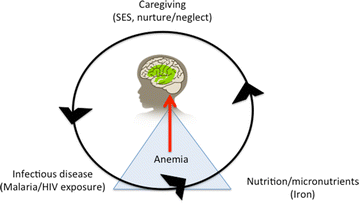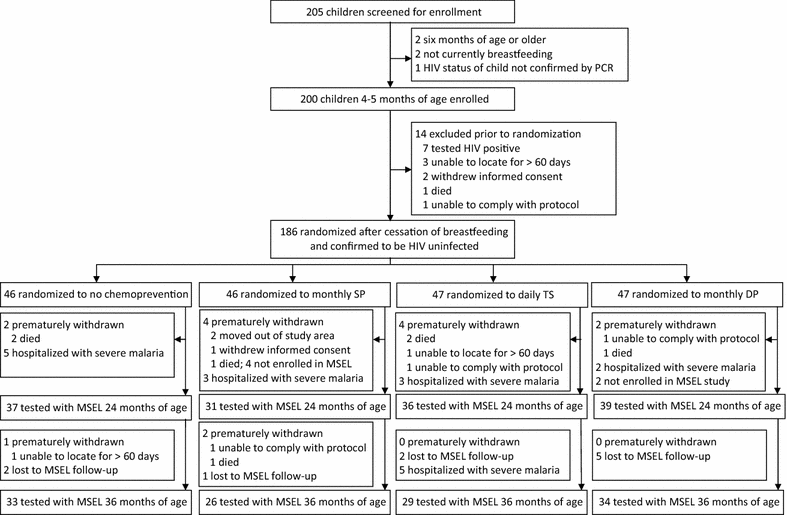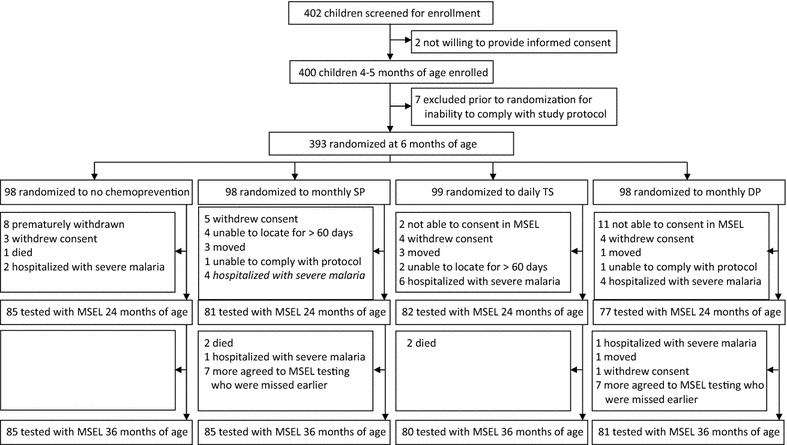Malaria illness mediated by anaemia lessens cognitive development in younger Ugandan children
- PMID: 27076184
- PMCID: PMC4831156
- DOI: 10.1186/s12936-016-1266-x
Malaria illness mediated by anaemia lessens cognitive development in younger Ugandan children
Abstract
Background: Asymptomatic falciparum malaria is associated with poorer cognitive performance in African schoolchildren and intermittent preventive treatment of malaria improves cognitive outcomes. However, the developmental benefits of chemoprevention in early childhood are unknown. Early child development was evaluated as a major outcome in an open-label, randomized, clinical trial of anti-malarial chemoprevention in an area of intense, year-round transmission in Uganda.
Methods: Infants were randomized to one of four treatment arms: no chemoprevention, daily trimethoprim-sulfamethoxazole, monthly sulfadoxine-pyrimethamine, or monthly dihydroartemisinin-piperaquine (DP), to be given between enrollment (4-6 mos) and 24 months of age. Number of malaria episodes, anaemia (Hb < 10) and neurodevelopment [Mullen Scales of Early Learning (MSEL)] were assessed at 2 years (N = 469) and at 3 years of age (N = 453); at enrollment 70 % were HIV-unexposed uninfected (HUU) and 30 % were HIV-exposed uninfected (HEU).
Results: DP was highly protective against malaria and anaemia, although trial arm was not associated with MSEL outcomes. Across all treatment arms, episodes of malarial illness were negatively predictive of MSEL cognitive performance both at 2 and 3 years of age (P = 0.02). This relationship was mediated by episodes of anaemia. This regression model was stronger for the HEU than for the HUU cohort. Compared to HUU, HEU was significantly poorer on MSEL receptive language development irrespective of malaria and anaemia (P = 0.01).
Conclusions: Malaria with anaemia and HIV exposure are significant risk factors for poor early childhood neurodevelopment in malaria-endemic areas in rural Africa. Because of this, comprehensive and cost/effective intervention is needed for malaria prevention in very young children in these settings.
Figures



References
-
- Fernando D, de Silva D, Carter R, Mendis KN, Wickremasinghe R. A randomized, double-blind, placebo-controlled, clinical trial of the impact of malaria prevention on the educational attainment of school children. Am J Trop Med Hyg. 2006;74:386–393. - PubMed
Publication types
MeSH terms
Substances
Grants and funding
LinkOut - more resources
Full Text Sources
Other Literature Sources
Medical

